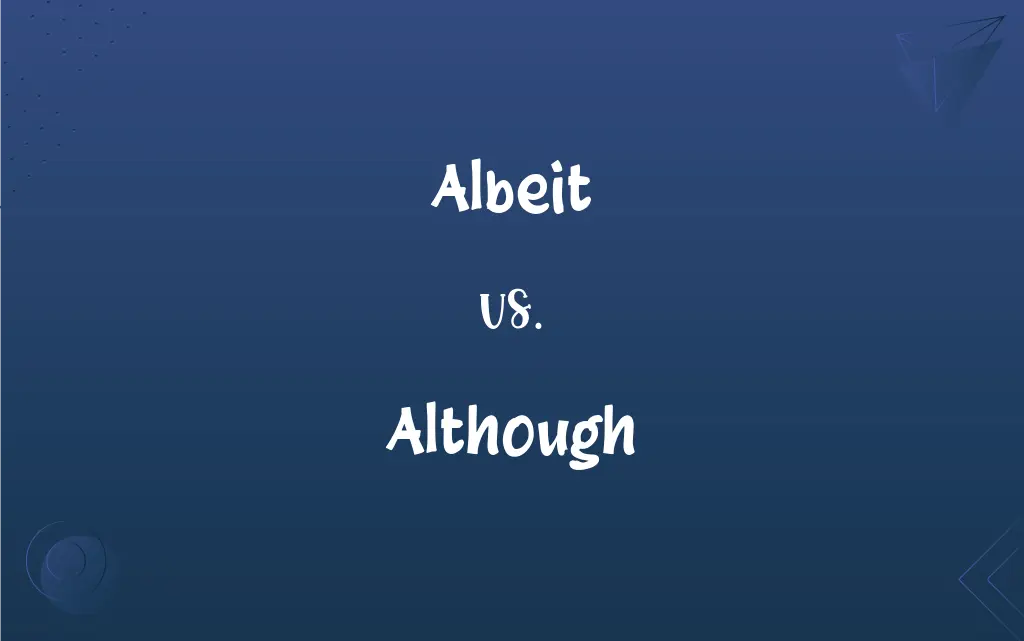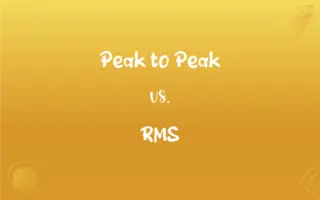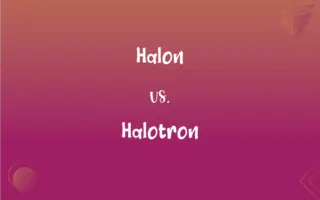Albeit vs. Although: What's the Difference?
Edited by Janet White || By Harlon Moss || Published on December 9, 2023
"Albeit" means "although" but is often used to introduce a concessive clause, focusing on a contrast or exception; "although" introduces a contrasting statement in a broader range of contexts.

Key Differences
"Albeit" and "although" both function as conjunctions used to introduce contrasting statements. However, "albeit" is more formal and typically introduces a specific concession or exception within a statement. For example, "He accepted the job, albeit with some hesitation," indicates a specific reservation within the acceptance. On the other hand, "although" is more versatile and is used in a wider variety of contexts to introduce contrast, as in "Although it was raining, we went for a walk."
In terms of usage, "albeit" is less common and more formal than "although." It often appears in written, academic, or formal contexts. For example, "The plan was successful, albeit challenging to implement," shows a formal tone. Conversely, "although" is widely used in both spoken and written English, fitting into casual and formal contexts alike, as in "Although he's young, he's very responsible."
Syntax differentiates "albeit" from "although." "Albeit" typically introduces a concessive clause that is more succinct, often just a phrase, as in "It was a wonderful evening, albeit short." In contrast, "although" introduces a full clause with a subject and a verb, as in "Although the evening was short, it was wonderful."
The origin of "albeit" is Middle English, where it meant "although it be that," and it retains a sense of presenting a more specific or narrowed down contrast. "Although" has a broader origin from Old English, which reflects its more general usage in presenting any form of contrast or contradiction, like in "Although he tried hard, he did not succeed."
"Albeit" and "although" are similar in their basic function of introducing contrast, they differ in formality, frequency of use, syntactical structure, and the nature of the contrast they introduce. "Albeit" is formal and specific, while "although" is versatile and broadly used.
ADVERTISEMENT
Comparison Chart
Formality
More formal, often used in academic or formal writing.
Less formal, widely used in both spoken and written English.
Frequency of Use
Less common, more specific in usage.
More common, versatile in various contexts.
Syntactic Structure
Introduces a concise concessive phrase or clause.
Introduces a full clause with a subject and verb.
Context of Contrast
Presents a specific concession or exception.
Introduces a broader range of contrasting statements.
Origin
Middle English, meaning "although it be that."
Old English, with a broader historical usage.
ADVERTISEMENT
Albeit and Although Definitions
Albeit
Introducing a concession or exception.
She agreed to go, albeit reluctantly.
Although
Used to contrast one part of a sentence with another.
Although tired, she continued to work.
Albeit
Indicating a partial truth.
The event was a success, albeit a small one.
Although
Introducing a contradictory element.
Although it was cold, they went swimming.
Albeit
Used to introduce a mitigating or qualifying statement.
He was making progress, albeit slowly.
Although
Indicating a situation's continuation despite a contrast.
Although he was late, the meeting hadn't started.
Albeit
Synonymous with "although," but more formal.
The movie was enjoyable, albeit predictable.
Although
Showing unexpectedness in a situation.
Although inexperienced, he performed exceptionally well.
Albeit
To concede something before making a statement.
It's a small shop, albeit well-stocked.
Although
Expressing a difference of situation or fact.
Although the task was hard, they completed it on time.
Albeit
Even though; although; notwithstanding
Clear albeit cold weather.
Although
Regardless of the fact that; even though
Although the room is big, it won't hold all that furniture.
Albeit
Although, despite (it) being.
Although
But; however
He says he has a dog, although I've never seen it.
Albeit
Even though; although; notwithstanding.
Albeit so masked, Madam, I love the truth.
Although
Though, even though, in spite of or despite the fact that: introducing a clause that expresses a concession.
Although it was very muddy, the football game went on.
The patients, (al)though getting stronger, will not come off their medications.
Although
But, except.
It was difficult, although not as difficult as we had expected.
Although
Grant all this; be it that; supposing that; notwithstanding; though.
Although all shall be offended, yet will not I.
Although
Despite the fact that;
Even though she knew the answer, she did not respond
FAQs
Is "albeit" common in everyday speech?
No, it's more common in formal writing.
Can "albeit" start a sentence?
It's unusual; "albeit" typically appears mid-sentence.
Can "although" introduce a full clause?
Yes, it typically introduces a full clause.
Is "albeit" a conjunction?
Yes, it's a concessive conjunction.
Does "although" work in formal reports?
Yes, it's suitable for both formal and informal contexts.
Is "albeit" interchangeable with "although"?
Not always; "albeit" is more formal and specific.
Is "albeit" used in academic writing?
Yes, it's frequently used in academic contexts.
Can "although" start a sentence?
Yes, "although" can begin a sentence.
Can "albeit" introduce a phrase instead of a full clause?
Yes, it often introduces a shorter phrase.
Can "although" connect two independent clauses?
Yes, it's often used to link contrasting clauses.
Does "although" have a formal tone?
It can be both formal and informal.
Does "although" express contrast?
Yes, it's used to introduce contrasting ideas.
Is "although" a subordinate conjunction?
Yes, it introduces a subordinate clause.
Does "although" imply a strong contrast?
It implies a contrast, but not necessarily a strong one.
Can "albeit" be used in legal documents?
Yes, it's suitable for formal, legal writing.
Is "although" suitable for casual conversation?
Yes, it's commonly used in everyday language.
Is "albeit" old-fashioned?
It's more formal, sometimes seen as old-fashioned.
Is "albeit" easy to use for non-native speakers?
It might be challenging due to its specific use.
Can "although" be replaced with "even though"?
Yes, in many cases, they are interchangeable.
Should "albeit" be avoided in informal writing?
Not necessarily, but it's less common in informal contexts.
About Author
Written by
Harlon MossHarlon is a seasoned quality moderator and accomplished content writer for Difference Wiki. An alumnus of the prestigious University of California, he earned his degree in Computer Science. Leveraging his academic background, Harlon brings a meticulous and informed perspective to his work, ensuring content accuracy and excellence.
Edited by
Janet WhiteJanet White has been an esteemed writer and blogger for Difference Wiki. Holding a Master's degree in Science and Medical Journalism from the prestigious Boston University, she has consistently demonstrated her expertise and passion for her field. When she's not immersed in her work, Janet relishes her time exercising, delving into a good book, and cherishing moments with friends and family.








































































